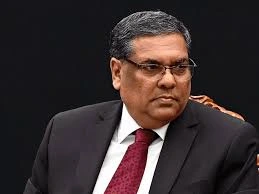Chief Justice of India Sanjiv Khanna on Tuesday recused himself from hearing a batch of petitions challenging the constitutional validity of legislation related to the appointment of the Chief Election Commissioner and Election Commissioners.
The Bench of CJI Sanjiv Khanna and Justice Sanjay Kumar issued notice to the Union of India and the Election Commission of India on the petitions challenging the constitutional validity of Sections 7 and 8 of the Chief Election Commissioner and Other Election Commissioners (Appointment, Conditions of Service and Term of Office) Act, 2023.
The Apex Court further ordered that the petitions, filed by Congress leader Jaya Thakur, the Association for Democratic Reforms (ADR), the People’s Union for Civil Liberties (PUCL) and Lok Prahari, be listed in the week commencing on January 6, 2025, before another Bench.
Earlier, the Bench of Justice Khanna and Justice Dipankar Datta had refused to stay the law, ahead of the 2024 Lok Sabha elections.
Passed in December 2023, the Election Commissioners’ Act replaced the Election Commission (Conditions of Service of Election Commissioners and Transaction of Business) Act, 1991.
As per the new law, the President would appoint the Election Commissioners, based on the recommendation of a Selection Committee.
The Committee would give its recommendations after considering a list of candidates proposed by a search committee headed by the Union Law Minister.
As per Section 7 of the Act, the Selection Committee would consist of the Prime Minister, a Union Cabinet Minister, and the Leader of the Opposition or the leader of the largest opposition party in the Lok Sabha.
Section 8 of the Act gave liberty to the panel to regulate its own procedure in a transparent manner, and even consider persons other than those suggested by the search committee.
The new law was made after a Constitution Bench led by Justice (Retd) KM Joseph directed the Election Commissioners to be appointed by the President on the advice of a committee consisting of the Prime Minister, the Leader of the Opposition, and the Chief Justice of India to maintain the independence of the Election Commission from the executive branch.
The Apex Court, however, clarified that its direction was of an ad-hoc nature to remain in force till the Parliament enacted a law in the matter.


